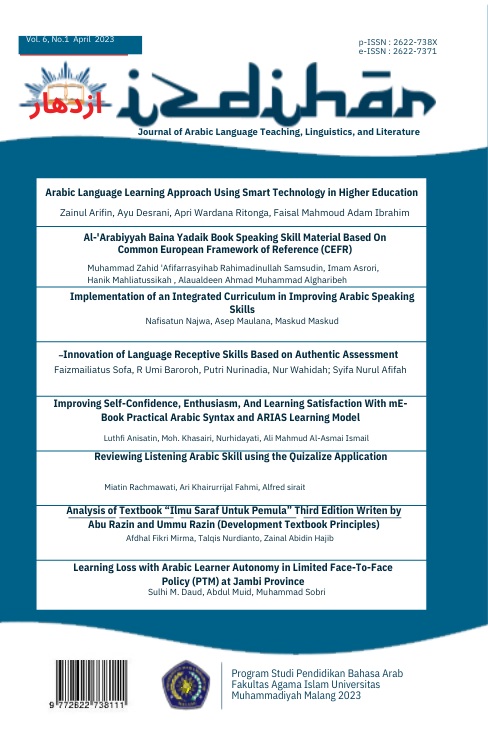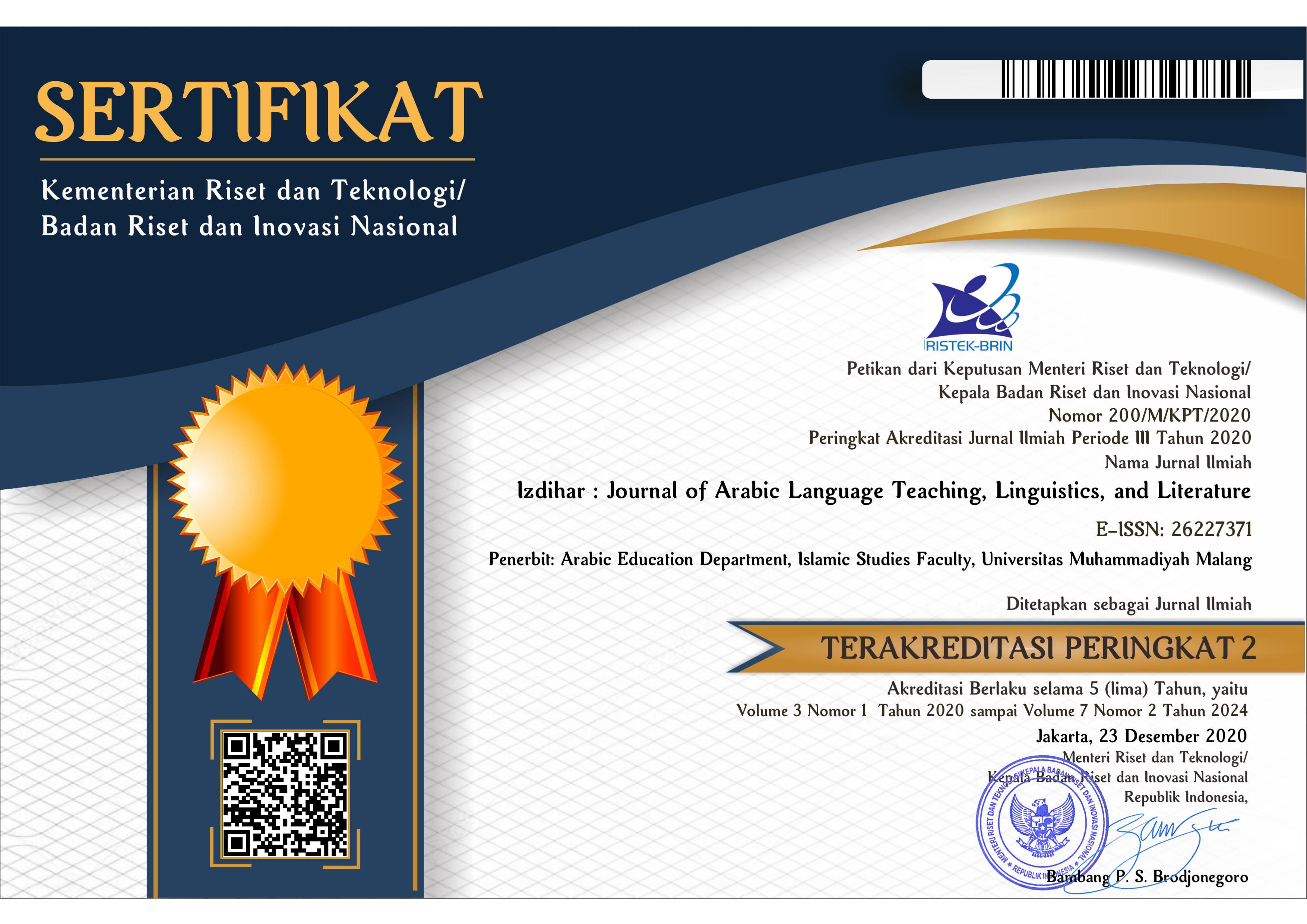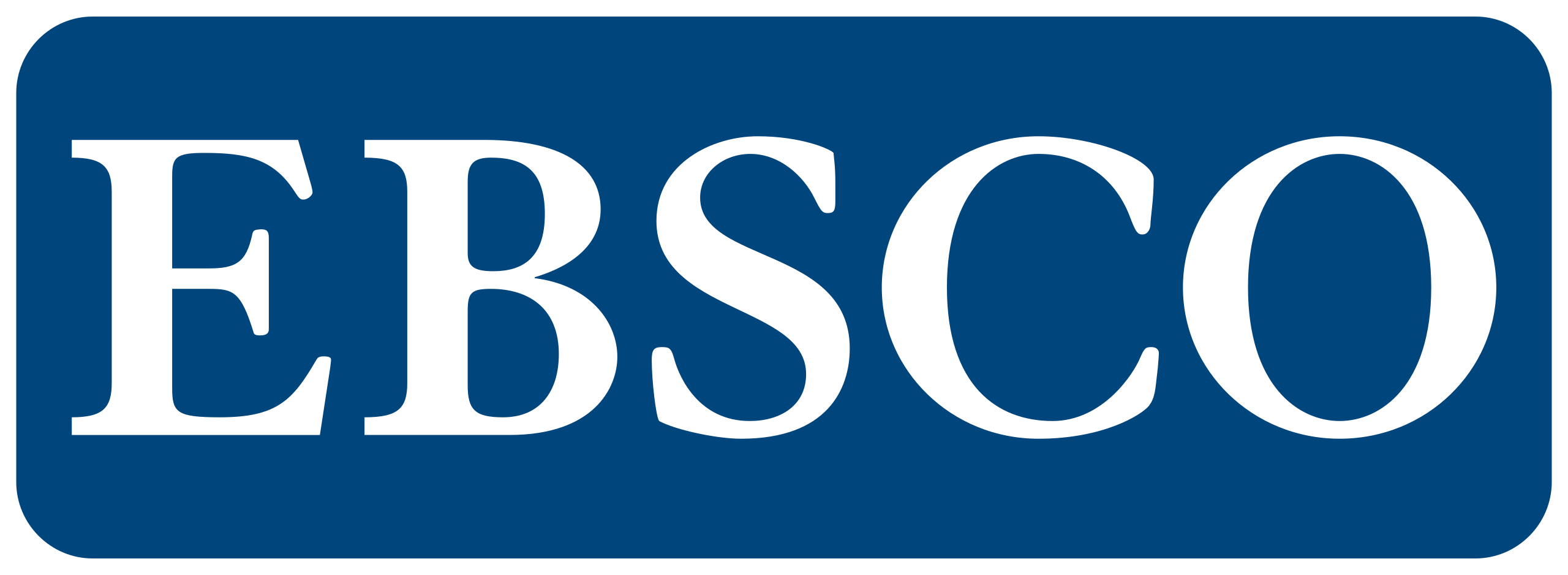Learning Loss with Arabic Learner Autonomy in Limited Face-To-Face Policy (PTM) at Jambi Province
DOI:
https://doi.org/10.22219/jiz.v6i1.23632Keywords:
learner autonomy, learning loss, PTMAbstract
Learner autonomy is the main solution for overcoming learning loss in the limited face-to-face policy (PTM) that was implemented in Indonesia in early 2022. This research is based on the phenomenon of the decreasing quality of learning Arabic due to the pandemic. A qualitative research approach with the type of case studies used in this research is used to reveal the decline in learning and independent learning at tertiary institutions in Jambi Province. A case study approach is used in this study. The main findings and results are described by uncovering a case of learning loss in limited face-to-face policies in Jambi Province. This research addresses two main focuses: First, the phenomenon of learning loss is caused by several factors, such as adaptation to hybrid learning, limited internet access, minimal learning platform services, and technological stuttering. Finally, learner autonomy on limited face-to-face learning (PTM) policies in Jambi implementation of independent learners By the Autonomy Learning Scale (ALS), fulfilling the seven aspects of self-learning implementation with the highest (good enough) score on the three categories of self-awareness indicators (6.5 score), self-effort (6.5 and extensive autonomous activities (6.7 score) achieves a score of 6.7. And the low category on the aspect of self-confidence with a score of 2.5 and motivation, which only gets a score of 0.5.
Downloads
References
Akcaoglu, M., Lucy, •, Green, S., & Santos Green, L. (2018). Association for Educational Communications and Technology. Educational Technology Research and Development.
Anazifa, R. D., & Pratama, A. T. (2020). LEARNER AUTONOMY MAHASISWA PENDIDIKAN BIOLOGI PADA PEMBELAJARAN DARING SELAMA MASA PANDEMI. Jurnal Pelita Pendidikan, 8(4). https://doi.org/10.24114/jpp.v8i4.21199
Andriani, W., Subandowo, M., Karyono, H., & Gunawan, W. (2021). Learning Loss dalam Pembelajaran Daring di Masa Pandemi Corona. Prosiding Seminar Nasional Teknologi Pembelajaran Universitas Negeri Malang, 2, 485–501.
Arif Pamessangi, A. (2020). تطبيق تعليم اللغة الجماعة في تعليم اللغة العربية. لسـانـنـا (LISANUNA): Jurnal Ilmu Bahasa Arab Dan Pembelajarannya, 9(2), 299. https://doi.org/10.22373/ls.v9i2.6748
Bramantha, H. (2019). Pengaruh Kemandirian Belajar Terhadap Hasil Belajar Siswa. Madrosatuna : Jurnal Pendidikan Guru Madrasah Ibtidaiyah, 2(1), 21–28. https://doi.org/10.47971/mjpgmi.v2i1.63
Bukhteeva, E. (2019). Practical and Theoretical Grounds of a Student’s Autonomous Learning Activities in Professional Education. Amazonia Investiga, 8(20), 575–81. Retrieved from https://amazoniainvestiga.info/index.php/amazonia/article/view/184
Creswell, J. W. (2012). Educational research: Planning, conducting, and evaluating quantitative and qualitative research. In Educational Research (Vol. 4).
Donnelly, R., & Patrinos, H. A. (2021). Learning loss during Covid-19: An early systematic review. Prospects, 0123456789. https://doi.org/10.1007/s11125-021-09582-6
Engzell, P., Frey, A., & Verhagen, M. D. (2021). Learning loss due to school closures during the COVID-19 pandemic. Proceedings of the National Academy of Sciences of the United States of America, 118(17). https://doi.org/10.1073/PNAS.2022376118
González-Treviño, I. M., Núñez-Rocha, G. M., Valencia-Hernández, J. M., & Arrona-Palacios, A. (2020). Assessment of multiple intelligences in elementary school students in Mexico: An exploratory study. Heliyon, 6(4). https://doi.org/10.1016/j.heliyon.2020.e03777
Hapsari Mita Amalia. (2022). Ini Aturan Terbaru FACE-TO-FACE MEETINGTerbatas Sesuai SE Kemendikbud Nomor 2 2022. Https://Www.Kompas.Com/
Hidayati, T., & Husna, F. (n.d.). Learning English from Home during the Covid-19: Investigating Learners’ Experience for Online and Autonomous Learning. Langkawi: Journal of The Association for Arabic and English, 6(2), 202–17,. https://doi.org/10.31332/lkw.v0i0.2223.
Interview. (2022). Interview.
Iryani, E., Sobri, M., & Tersta, F. W. (2020). Autonomous Learning: Manifestasi Merdeka Belajar Bahasa di Prodi Pendidikan Bahasa Arab. Arabia, 12(2). https://doi.org/10.21043/arabia.v12i2.8392
Joshi, B., Dhakal, R., Bharati, S., Chandra Dhakal, S., & Raj Joshi, K. (2020). Effect of Planting Depth and Mulching Materials on Yield and Yield Attributes of Potato in Dadeldhura, Nepal. Agriculture, Forestry and Fisheries, 9(3). https://doi.org/10.11648/j.aff.20200903.12
Kaharuddin, K. (2019). محاولات تنمية مهارة الكلام في تعليم اللغة العربية بالمعهد العالي للأسعدية سنكامغ سلاويسي الجنوبية. LISANIA: Journal of Arabic Education and Literature, 3(2), 217–230. https://doi.org/10.18326/lisania.v3i2.217-230
Kashyap, A. M., Sailaja, S. V., Srinivas, K. V. R., & Raju, S. S. (2021). Challenges in online teaching amidst covid crisis: Impact on engineering educators of different levels. Journal of Engineering Education Transformations, 34(Special Issue). https://doi.org/10.16920/jeet/2021/v34i0/157103
Kemendikbud. (2019). Merdeka Belajar. In Kementerian Pendidikan Dan Kebudayaan.
Kementrian Pendidikan dan Kebudayaan Indonesia. (2019). Mendikbud Tetapkan Empat Pokok Kebijakan Pendidikan “Merdeka Belajar.” Www.Kemdikbud.Go.Id.
Kreibich, A., Hennecke, M., & Brandstätter, V. (2020). The Effect of Self-awareness on the Identification of Goal-related Obstacles. European Journal of Personality, 34(2). https://doi.org/10.1002/per.2234
Lengkanawati, N. S. (2017). Learner autonomy in the indonesian efl settings. Indonesian Journal of Applied Linguistics, 6(2), 222–231. https://doi.org/10.17509/ijal.v6i2.4847
Long, D. R., Strauss, A., & Corbin, J. (1993). Basics of Qualitative Research: Grounded Theory Procedures and Techniques. The Modern Language Journal, 77(2). https://doi.org/10.2307/328955
Ma, G., Black, K., Blenkinsopp, J., Charlton, H., Hookham, C., Pok, W. F., Sia, B. C., & Alkarabsheh, O. H. M. (2022). Higher education under threat: China, Malaysia, and the UK respond to the COVID-19 pandemic. Compare, 52(5). https://doi.org/10.1080/03057925.2021.1879479
Masouleh, N. S., & Jooneghani, R. B. (n.d.). Autonomous Learning: A Teacher-Less Learning!,” Procedia - Social and Behavioral Sciences, 3rd. International Conference on New Horizons in Education - INTE 2012, 55, 835–42,. https://doi.org/10.1016/j.sbspro.2012.09.570.
McAlister, A. M. (n.d.). Qualitative Coding: An Approach to Assess Inter-Rater Reliability. 2017 ASEE Annual Conference & Exposition.
Miles, M. B., Huberman, A. M., & Saldana, J. (n.d.). Qualitative Data Analysis. SAGE.
Sumandiyar, A., Husain, Muh. N., Sumule G, M., Nanda, I., & Fachruddin, S. (2021). The effectiveness of hybrid learning as instructional media amid the COVID-19 pandemic. Jurnal Studi Komunikasi (Indonesian Journal of Communications Studies), 5(3), 651–664. https://doi.org/10.25139/jsk.v5i3.3850
Yusuf, A. M., Kuantitatif, M. P., Kualitatif, & Gabungan, P. (n.d.). No Title. Prenada Media.
Downloads
Published
How to Cite
Issue
Section
License
Copyright (c) 2023 Sulhi M. Daud, Abdul Muid, Muhammad Sobri

This work is licensed under a Creative Commons Attribution-ShareAlike 4.0 International License.
Copyright Notice
Authors who publish with this journal agree to the following terms:
- Authors retain copyright and grant the journal right of first publication with the work simultaneously licensed under a Creative Commons Attribution-ShareAlike 4.0 International License that allows others to share the work with an acknowledgment of the work's authorship and initial publication in this journal.
- Authors are able to enter into separate, additional contractual arrangements for the non-exclusive distribution of the journal's published version of the work (e.g., post it to an institutional repository or publish it in a book), with an acknowledgment of its initial publication in this journal.
- Authors are permitted and encouraged to post their work online (e.g., in institutional repositories or on their website) prior to and during the submission process, as it can lead to productive exchanges, as well as earlier and greater citation of published work (See The Effect of Open Access).
Copyright (c) 2019 Izdihar : Journal of Arabic Language Teaching, Linguistics, and Literature

This work is licensed under a Creative Commons Attribution-ShareAlike 4.0 International License.


















